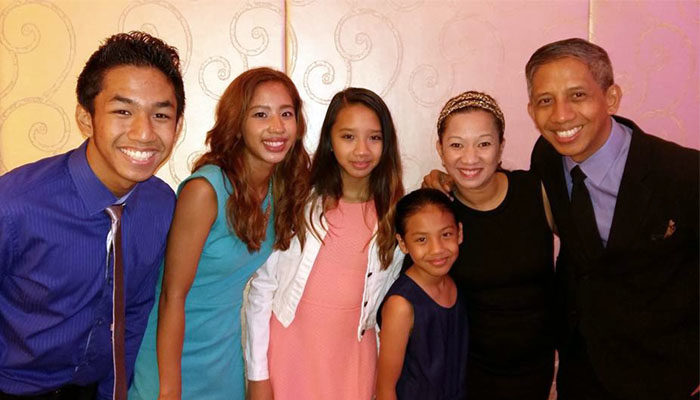
by Joshua Kho
Herald C. Cruz heads the parenting cluster of the Center for Family Ministries (CEFAM), and hosts the daily FEBC radio programs Serbisyong OFW and Hawak Kamay. He and his wife, Mellie have 4 beautiful children. Ten years ago, Herald and Mellie made a commitment to treat their children, not as a group, but as unique individuals.
How did you get started on this idea of one on one time with your kids?
Siguro realization naming mag-asawa na we’ve been trying to save families na baka we might lose our very own. Lagi kaming busy mag-asawa. Isang beses, tinanong namin ‘yung mga anak namin kung kumusta na sila. Sabi ‘nung dalawang babae, “We’re okay,” pero sabi ‘nung lalake,“You’re never home!” That made us realize na ‘yung presence namin sa mga bata ay importante kaya pa konti-konti nag-adjust kami. We started giving time to them. My wife and I go out with our children sama-sama and we also go out with them individually at least once a month. May mga bata din kasing nagsasalita lang kapag wala sa grupo, mas nag-e-express sila at nakikita mo ang mga pangarap nila, at saka kapag nag-spend time ka sa child mo, it makes them feel they are unique as a person at pinapahalagahan mo talaga sila.
Ang sabi nila at na-experience ko rin, lumalabas ‘yung quality time in quantity time. Kung madalas kayo magkasama ng anak mo, nagre-relax lang tapos biglang mag-o-open up siya sa ‘yo, mare-realize mo na isang special moment ‘yun. Hindi pinilit.
‘Yung lakad doesn’t have to be expensive. Ang crucial is for you to listen. Kasi kung nakikinig ka, they will talk. Kung ikaw ay puro talk, paano sila makaka-talk? So the rule is to try to listen. Ask your children open-ended questions. “How do you feel right now?” “What’s happening in school?” I talk to them about anything and everything including sex. The moment they start asking, sagutin mo na sila in ways that they can understand. For example, they see two dogs mating on the street. Magtatanong sila, “What are they doing?” It’s a good time to explain na it’s their way of having puppies, but as human beings and as Christians there is a right time, and a right place for that. So you give them lessons. Actually, maraming bata na-educate na ng media. Akala mo walang alam pero alam na pala kaso mali ‘yung kaalaman nila. Why not educate them in the house?
Kapag may tanong sila na hindi ko alam ang sagot, I tell them to give me time to think about it. But I’ll ask them, “Bakit gusto mong gawin ‘yan? Ano ang pang-matagalang effect nito? Alam mo ba’ng mga pros and cons of that decision?” So anything they say na bago sa akin, instead of avoiding the topic, tinuturuan mo‘ yung bata how to process their thoughts in order to make the right decision. Kasi kapag ang bata nagpa-alam sa iyo, tapos “YES” or “NO” ka lang, you are not teaching the child to process, pero kung itatanong mo, “Bakit gusto mo ‘yan? Do you think it will benefit you?” Kahit magkamali ‘yung bata mapro-process pa rin ‘yung pagkakamali para hindi masayang ‘yung lesson sa pagkakamali nila.
You can’t always be on your children’s side, how do you feel about this reality?
If early on in life naturuan mo na ‘yung mga bata ng mga non-negotiables and negotiables in your family, you have provided for them a compass. Tama eto, at ‘yun mali. Ang sabi ng child specialist, si Honey Carandang, the first twelve years are the planting stage. So the presence of the parents in the life of the child is very crucial. Our role as parents habang maliliit sila ay ibigay natin ‘yung tamang path for them and I believe through prayer and God’s grace they will choose the right path. The principles you teach them are applicable to all areas in life. Kapag adult na sila, they know how to process, “Is this the right person for me?” Sa pag-aasawa, kung they are okay inwardly, they will attract someone who is also whole inwardly. Kung maraming issues ‘yung bata they will also attract someone na maraming issues. So busugin mo ‘yung bata sa loob ng tahanan.
What if the kids don’t listen to your advice?
They say that parenting is 80% modelling. According to research kapag mino-model ng magulang, ang dali gayahin ng anak. You want to teach them about respect, if nakikita nila sa iyo ‘yung respect, they will follow. “Anak, ayusin mo ‘yung kwarto mo,” pero ‘yung kwarto mo naman ang gulo-gulo, how will they follow you? Ang bulk ng responsibility nasa magulang talaga.
Paano kung hindi close ang parents and children?
You have to know why. Hindi ba close kasi ang anak ay teenager na? Kasi kapag teenager na ‘yan normal lang magkaroon na sila ng sariling mundo. Ang focus nya ay kaibigan. O kaya, may sama ba ng loob ang anak sa magulang? May favouritism ba ang parents? Madami kasing reasons, ang communication pattern ba sa bahay ay negative? Kadalasan ang kailangan mag-adjust ay ‘yung magulang. Sabi nga kunin ‘yung kiliti ng bata kasi habang lumalaki, nag-a-adjust ‘yung bata, at maraming parents, they don’t adjust their type of parenting it just makes them ineffective. Ang mahusay na magulang ay nag-a-adjust habang nag-a-adjust ang anak. I have an acronym actually—DANCE.
- D – Discover your child. Ano ba ‘yung kanyang kiliti, attitude, love language?
- A – Accept the uniqueness of your child, kahit siya ay ibang-iba sa ‘yo.
- N – Nurture. I-nurture mo kung saan ‘yung gift ng mga bata. Halimbawa, ‘yung intelligence ng mga bata iba-iba and sometimes we compare them. Bakit hindi ka magmana sa ate mo, ang galing sa math? Eh, siya naman magaling sa sports.
- C – Celebrate the uniqueness of your child.
- E– Excellence in life, sa lahat ng aspeto ng buhay lalo na sa relationship sa sariling pamilya, ibang tao, at lalo na sa Panginoon. Kung nag-e-excel sa basketball, huwag dapat mayabang, mag-excel naman sa humility.
Then as a parent you can just DANCE with your kid. You have to be consistent as a parent. Consistency is the name of the game.




